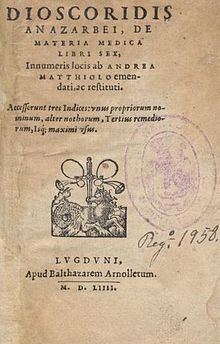De Materia Medica (Dioscorides)

Cover of an early printed version of
De Materia Medica. Lyon, 1554 |
|
| Author | Pedanius Dioscorides |
|---|---|
| Country | Ancient Rome |
| Subject | Medicinal plants, drugs |
|
Publication date
|
50–70 |
| Pages | 5 volumes |
| Text | at |
De Materia Medica (Latin name for the Greek work Περὶ ὕλης ἰατρικῆς, Peri hules iatrikēs, both meaning "On Medical Material") is a pharmacopoeia of herbs and the medicines that can be obtained from them. The five-volume work describes many drugs known to be effective, including aconite, aloes, colocynth, colchicum, henbane, opium and squill. In all, about 600 plants are covered, along with some animals and mineral substances, and around 1000 medicines made from them.
The work was written between 50 and 70 AD by Pedanius Dioscorides, a Greek physician in the Roman army. It was widely read for more than 1,500 years until supplanted by revised herbals in the Renaissance, making it one of the longest-lasting of all natural history books.
De Materia Medica was circulated as illustrated manuscripts, copied by hand, in Greek, Latin and Arabic throughout the mediaeval period. From the sixteenth century on, Dioscorides' text was translated into Italian, German, Spanish, and French, and in 1655 into English. It formed the basis for herbals in these languages by men such as Leonhart Fuchs, Valerius Cordus, Lobelius, Rembert Dodoens, Carolus Clusius, John Gerard and William Turner. Gradually such herbals included more and more direct observations, supplementing and eventually supplanting the classical text.
...
Wikipedia
